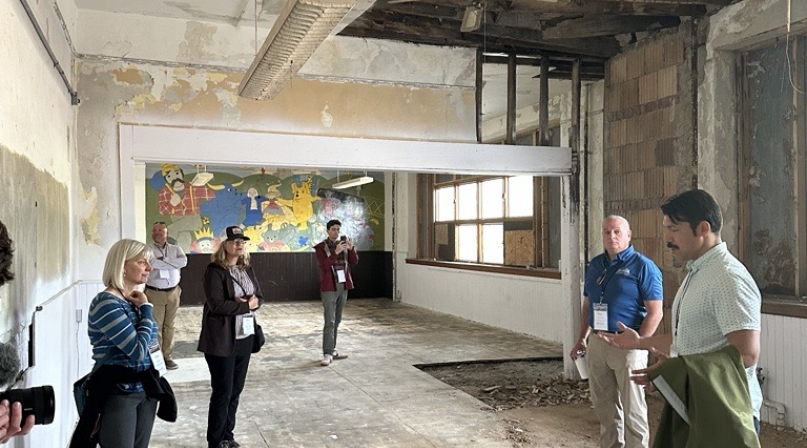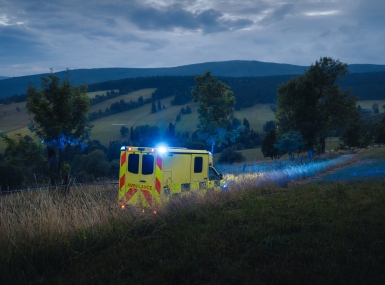Co-locating community: Rural revitalization in Fayette and Greenbrier Counties
Author
Upcoming Events
Related News

If your county is considering how to repurpose vacant school buildings, look to West Virginia’s counties for tips. This fall, NACo’s BRECC Commitment Coalition convened 20 leaders supporting coal-impacted communities for a three-day peer exchange to explore revitalization efforts across Fayette County and Greenbrier County, W.Va. Five historic school buildings stood out. Amid different rehabilitation phases, the five vacant school buildings are about to breathe new life into their community and fulfill multiples needs, including housing, lodging accommodations, childcare, community recreation and remote work.
In western Greenbrier County, the BRECC Commitment Coalition explored a school-to-housing development project in the coal-impacted community of Rupert. As a result of devastating floods in 2016, the Rupert Elementary School, a three-story school building, gymnasium and other structures, was decommissioned following construction of a new school at another location. Local leaders quickly took action to plan for repurposing of the school in cooperation with the local board of education. As other former schools in the county sat empty years after closure, the local leaders knew that collaborative efforts were imperative to assemble the team and resources needed to successfully reuse the former school.
Meadow River Valley Association, Inc.,(MRVA) a community nonprofit, originally formed to help spur community and economic development following the 2016 flood, focused-in on Rupert Elementary’s redevelopment potential. Based on input received during monthly community meetings, MRVA became determined to not only build new, quality housing options but also create new systems to foster healthy families, specifically through childcare and recreation opportunities. Led by Matt Ford, President of Greenbrier Environmental Group, Inc. and David Lumsden with the unwavering support of Tammy Tincher, Commissioner of Greenbrier County and member of the BRECC Commitment Coalition, they developed a housing project that will apply affordable rate requirements and is co-located with a childcare facility called The MARVEL Center.
As a first step, MRVA facilitated a strategic land swap between the local school board, the volunteer fire department, the developers for Rupert Elementary and The MARVEL Center (an essential childcare facility servicing the area). This resulted in the collocation of essential services and saved development costs, such as combining boundary work, electricity and grounds maintenance between the organizations.
To cover the six-million-dollar projected cost, the 20-unit housing development also tapped into several different funding streams. A public-private partnership between the MRVA and Woodlands Development opened access to Low Income Tax Credits (LITC), a historic building designation (registered through the NPS) and loans with the federal home-loan bank of Pittsburgh. To meet the community needs, seven units will be dedicated for residents with housing choice vouchers, and seven units will be workforce housing based on income eligibility. The remaining six units will be set at market rate and rented by the developers.
When asked about overcoming the challenges of the project, Ford said, “I would tell others ‘Don’t take no for an answer and be prepared to work really hard’. It’s all about a mindset of positivity and success.”
In Fayette County, the community has faced a steady population decline, shrinking from a peak population of 82,000 people to 46,000 due to the booms and busts of the coal industry. Over the years, schools consolidated and businesses closed shop, leaving empty buildings and a feeling of loss. However, the 2020 designation of the New River Gorge as a National Park and Preserve has sparked new opportunities for the county’s economy to flourish. So, when a developer presented the proposal to rehabilitate four blighted school buildings, the county and town came together to pursue the opportunity and create a modern boutique hotel, new apartments, a remote work center and a recreation facility in their community.
“Fayetteville is bursting at the seams when it comes to bringing new entrepreneurs and businesses and taking the same game plan of the region and getting new residents to strengthen our tax base.” said Gabe Peña, Town of Fayetteville Councilmember and BRECC Coalition member.
The project is designed to help Fayette County diversify its economy. By creating 50 hotel rooms, Fayetteville will attract new visitors that drive foot traffic to local businesses and restaurants. The project is also transforming a former basketball gymnasium into a business incubation and coworking facility that will foster remote work opportunities and entrepreneurship. The W.Va. Ascend Program, a state-wide effort to attract remote workers to West Virginia, is leading this unique construction project and the design features historic nods, such as stadium seats and a concessions counter, to complement the modern work cubicles and meeting space. In addition, 20 new apartments made from converted classrooms will expand Fayette County’s quality housing stock, which has been an ongoing challenge for residents. Colorful lockers still line the halls of the historic renovation project.
Standing as pillars of the community, the rehabilitated school buildings will continue to contribute to the success of local residents. The projects’ multipurpose designs are strategic, cost-effective and locally driven, supporting not only economic development but also community revitalization.
Featured Initiative
Building Resilient Economies in Coal Communities
The Building Resilient Economies in Coal Communities initiative connects coal communities, supports local leaders and builds capacity in under-resourced communities to advance new approaches and projects for economic diversification.

Related News

Podcast: Developing your county workforce
Counties are finding a renewed interest in professional development as a feature of their careers.

CMS announces Rural Health Transformation Program funding
On December 29, the Centers for Medicare & Medicaid Services (CMS) announced $50 billion in awards over 5 years to all 50 states under the Rural Health Transformation Program.
